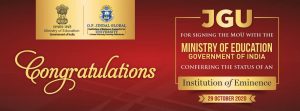Seminar on ‘Diversity, Inclusion and Internalization: Comparative Perspectives’ and Launch of Report on ‘Diversity and Inclusion: Towards Building a Diverse, Equitable and Global University’
New Delhi, 19th March 2019: In a nation which celebrates unity in diversity in every aspect of life, its indeed a responsibility of its education system to embrace the same. And precisely, that has been the goal of O. P. Jindal Global University (JGU) since its inception. A report on ‘Diversity and Inclusion: Towards Building a Diverse, Equitable and Global University’ was launched on the occasion.
As the university completes a decade in its journey, this idea of retaining diversity through the process of inclusion has been considered a key to its success. Distinguished educationists on ‘Diversity, Inclusion and Internalization: Comparative Perspectives’ marking the 10th anniversary of the institution, all the speakers thus praised this approach and initiative towards higher education.
The report is an endeavour of JGU’s journey so far, its vision and creating an inclusive education system that embraces the vast diversity present in the students, faculty and subjects taught. As pointed out the report, the 16 key indicators that JGU takes into account to reach this scenario are: national origin, state origin, gender parity, age, religion and caste, education and professional background, disability, academic offerings and interdisciplinary, pedagogy, Research and disciplinary diversity, international collaborations and partnerships, governance and leadership, student financial inclusion, inclusive teaching and learning, gender identity and sexual orientation, and community outreach and engagement. These indicators have helped JGU achieve an environment which boasts of sustaining the diverse flavours and perspectives in equality.
The conference brought in multiple voices of stakeholders of global higher education: Professor (Dr.) Virander S. Chauhan, Chairman, National Assessment and Accreditation Council (NAAC); Professor (Dr.) Stephen P. Marks, François-Xavier Bagnoud Professor of Health and Human; Professor (Dr.) Shiv Visvanathan, Vice Dean, Jindal Global Law School; Hon’ble Ms. Justice Sabrina S. McKenna, Judge, Supreme Court of Hawaii, USA and Hon’ble Mr. Justice Michael D. Wilson, Judge, Supreme Court of Hawaii, USA.
According to Professor (Dr.) C Raj Kumar, Founding Vice Chancellor, JGU, the idea of this unique pluralism is deeply embedded in India’s philosophy. And the unique characteristic binds the nation is indeed its diversity in terms of religion, caste, language, festivals, dressing styles, culinary etc. “This same philosophy is the basis of this institution,” he said.
Professor (Dr.) Virandar S. Chauhan, Chairman, National Assessment and Accreditation Council (NAAC), said, “A lot of universities which are celebrated in India are mono-universities and they hardly have any notion of diversity. Why can’t our management institutes start having basic courses in Economics, Financial Mathematics and so on? That’s what you’re trying to do at Jindal Global University, the university is outstanding and it should be spread in whichever way, this has to be understood in IIT, IIM, IISERS- now there are several IISERS, each IISER only teaches 2000 students, it’s an extremely expensive proposition but if you will not find a historian, a political scientist or a philosopher in any of those institutes that I mentioned, and I find the future of universities has to be the way you’re growing. You have to have diversity in faculty, in the subjects that you offer”.
He cited the example of John Neumann from Oxford and Humboldt, who started Berlin University, one of the basic three pillars was the diversity, “that people should come to you from all walks of life, you should learn inside and outside the class and you should be able to interact in the evening in the common rooms in a university which allows different ideas, opinions, allows you to accept somebody else’s ideas and so on. I think that mono universities, while they produce really good students, but I wonder if that is the education. The future of universities, in my heart, will have a complex university where you have huge diversity of students, of faculty, of subjects you teach, of research you’ve done”.
Talking on the report on the other hand, Princy Marin George, Director, Office of Strategic Initiatives and Institutional Research & Executive Director, Centre for Global Higher Education Features, JGU explained, “The idea was to provide a taste of the journey that creates a holistic experience both inside and outside the classroom to aim at inclusion of the diversity in our approach.”
Taking the narrative ahead, Professor (Dr.) Shiv Visvanathan, Professor & Vice Dean, Jindal Global Law School remarked, “Diversity is a kind of responsibility to preserve the imaginations of groups with diverse characteristics. It can be called a pilgrimage through that variety of language, cast and religion, traverse and discover the uniqueness of each variety.” JGU attempts to do the same, he added.
Higher education institutions in particular necessitate that a plurality of approaches be adopted in their academic, operational and functional spaces. These relate to a multiple aspects including socio-economic backgrounds, gender, age, geographical origin, sexual orientation, race, religion, ethnicity, cast and abilities. In this particular case of higher education institutions, this also extends to pedagogical approaches, interdisciplinarity, academic offerings and inclusivity within leadership & governance structures.


